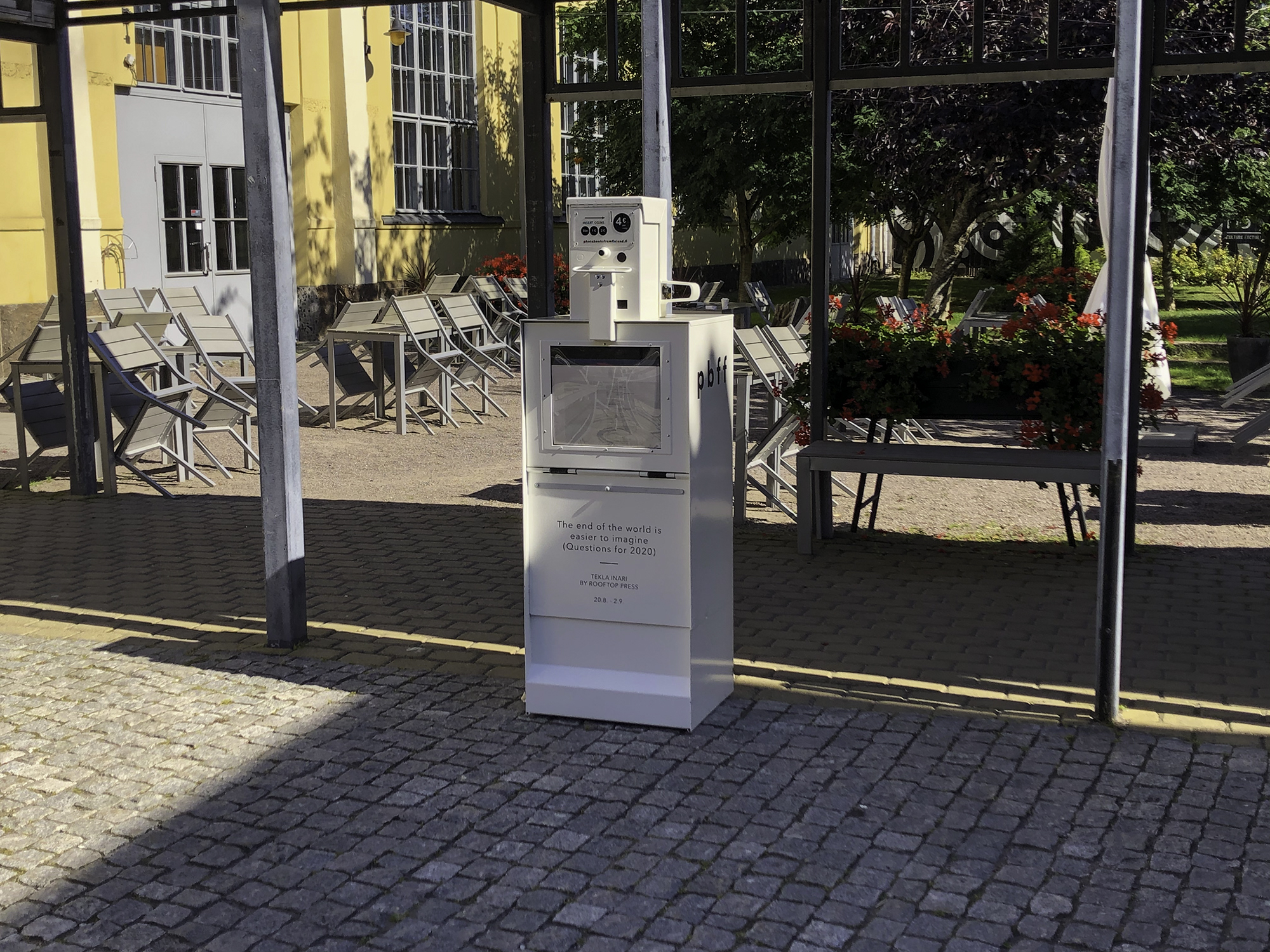
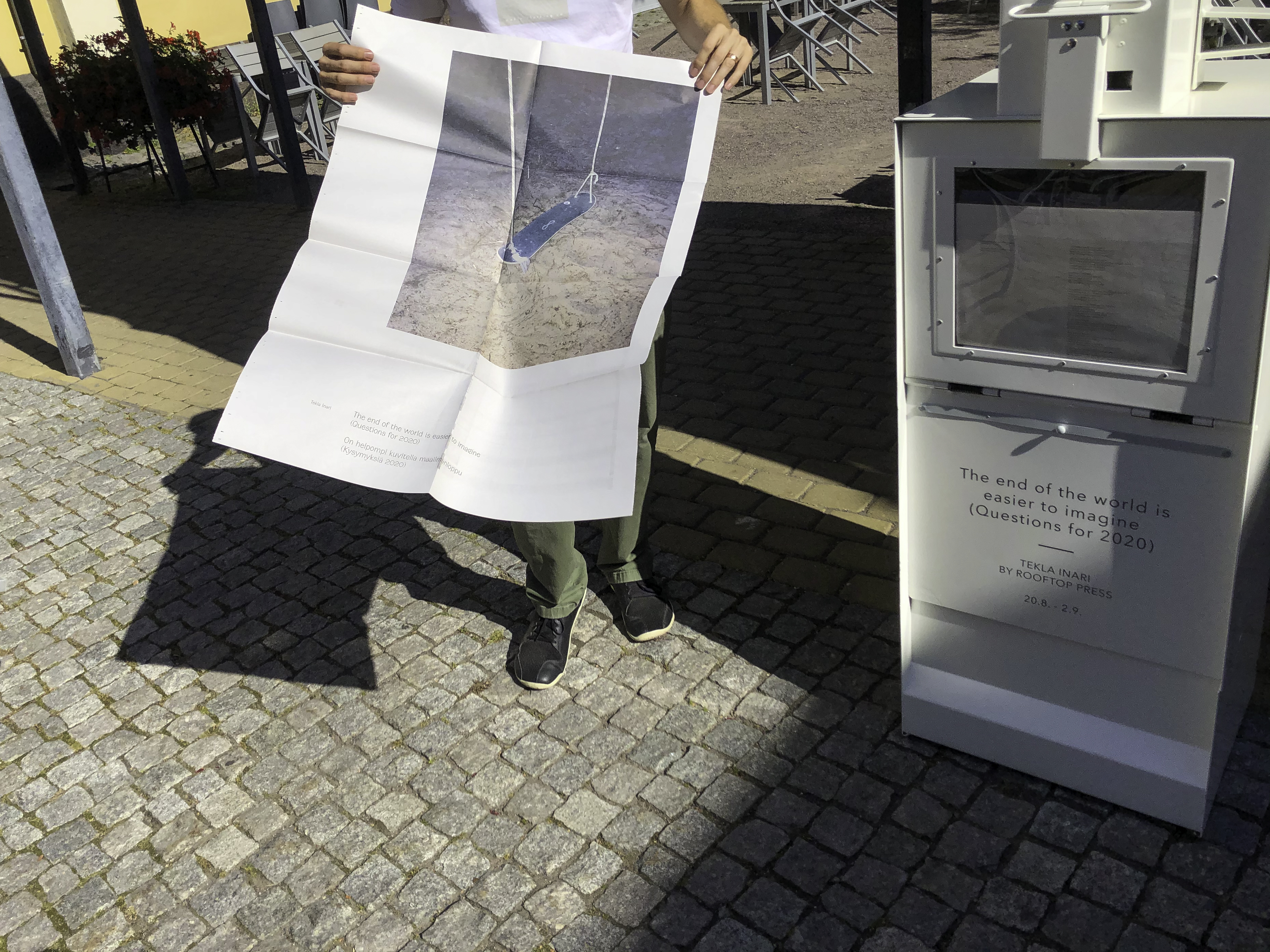
The Newspaper Vending Machine: Tekla Inari by Rooftop Press
The end of the world is easier to imagine (Questions for 2020)
20.8.–2.9.2020
PBFF (Photobooks from Finland) has invited nine artists and/or artists’ collectives to create publications using the newspaper format. The artists and artists’ collectives work in Finland, in various fields of visual art.
The first publication is The end of the world is easier to imagine (Questions for 2020) by Tekla Inari by Rooftop Press.
A poetical reflection on the complex relationships between people and things, events and places in a neoliberal society of the neverending tiny spectacle. In her timely belles-lettres the artist participates in ongoing conversations around a variety of issues such as alienation, love, body politics, urban planning, structural oppression hiding in plain sight and the painful limitations of human communication. The discursive, meditative investigation is conducted with warmth and an open hearted empathy towards narrator’s fellow entities.
Rooftop Press is a Helsinki based nonprofit publishing initiative exploring publishing as artistic practice and publications as space for contemporary art. By working collaboratively and in close dialogue with other artists, the publishers aim at expanding the potential and deepening the undesrtanding of what it means to publish within an artistic context. Rooftop Press maintains a micro press Vallilan risopaja and organises an occasional artist’s publishing event Bookies.
The Newspaper Vending Machine is supported by the Arts Promotion Centre Finland. It is realised in cooperation with the Association of Photographic Artists and Korjaamo Culture Factory.
Tekla Inari by Rooftop Press
Design: Tekla Inari & Jaakko Suomalainen
Language: English & Finnish
English translation: Kasper Salonen
Printing: Printall
Published by Rooftop Press and PBFF
single sheet folded in eight
220 x 315 mm / 630 x 880 mm
rotary colour offset on Exo H 76 PEFC 52g newsprint
Edition of 500
ISBN 978-952-7258-14-9
The end of the world is easier to imagine (Questions for 2020)
20.8.–2.9.2020
PBFF (Photobooks from Finland) has invited nine artists and/or artists’ collectives to create publications using the newspaper format. The artists and artists’ collectives work in Finland, in various fields of visual art.
The first publication is The end of the world is easier to imagine (Questions for 2020) by Tekla Inari by Rooftop Press.
A poetical reflection on the complex relationships between people and things, events and places in a neoliberal society of the neverending tiny spectacle. In her timely belles-lettres the artist participates in ongoing conversations around a variety of issues such as alienation, love, body politics, urban planning, structural oppression hiding in plain sight and the painful limitations of human communication. The discursive, meditative investigation is conducted with warmth and an open hearted empathy towards narrator’s fellow entities.
Rooftop Press is a Helsinki based nonprofit publishing initiative exploring publishing as artistic practice and publications as space for contemporary art. By working collaboratively and in close dialogue with other artists, the publishers aim at expanding the potential and deepening the undesrtanding of what it means to publish within an artistic context. Rooftop Press maintains a micro press Vallilan risopaja and organises an occasional artist’s publishing event Bookies.
The Newspaper Vending Machine is supported by the Arts Promotion Centre Finland. It is realised in cooperation with the Association of Photographic Artists and Korjaamo Culture Factory.
Tekla Inari by Rooftop Press
Design: Tekla Inari & Jaakko Suomalainen
Language: English & Finnish
English translation: Kasper Salonen
Printing: Printall
Published by Rooftop Press and PBFF
single sheet folded in eight
220 x 315 mm / 630 x 880 mm
rotary colour offset on Exo H 76 PEFC 52g newsprint
Edition of 500
ISBN 978-952-7258-14-9
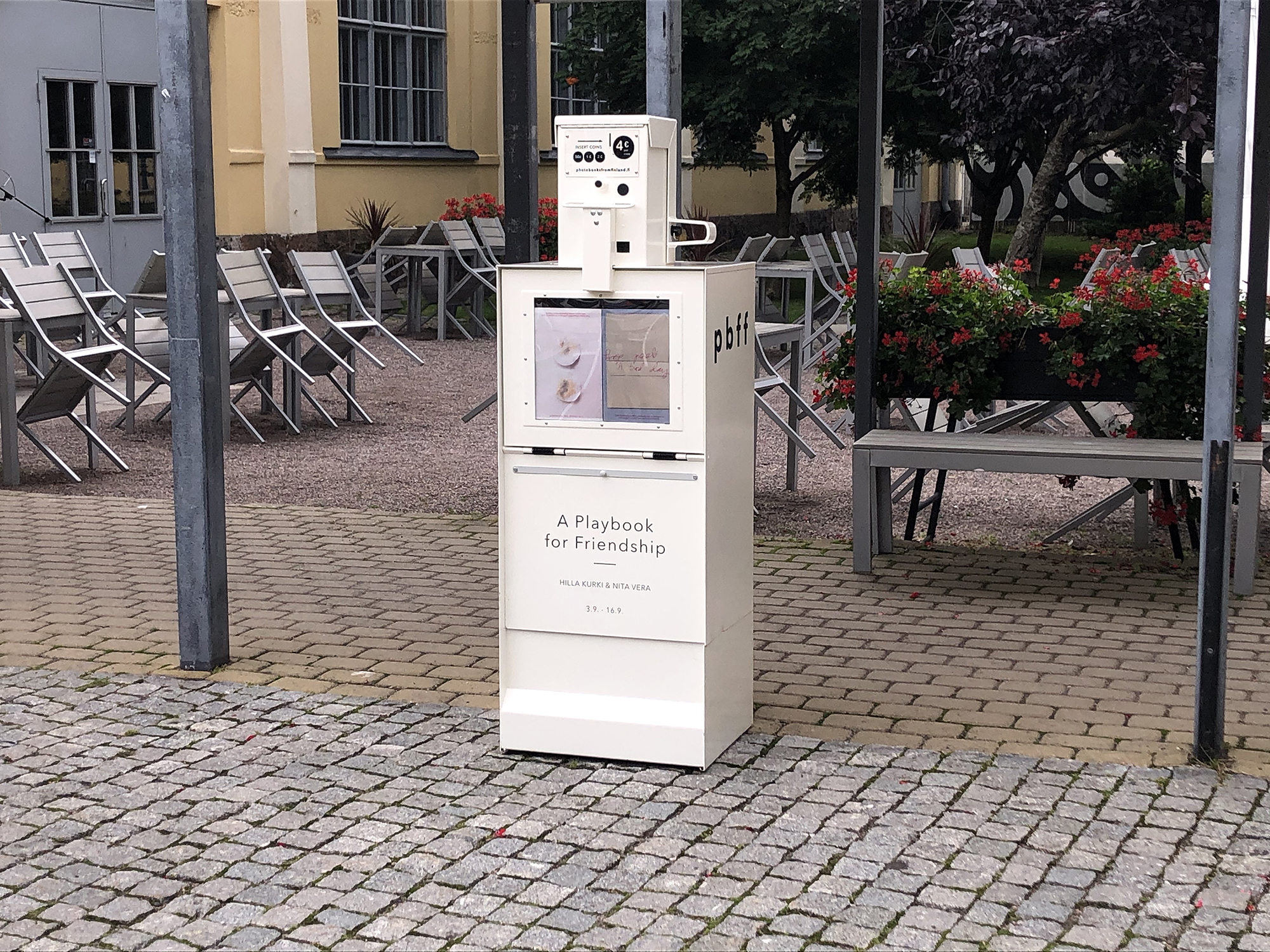

Hilla Kurki and Nita Vera
Playbook for Friendship
3.9.–16.9.2020
Playbook for Friendship is the outcome of an art experimentation Hilla Kurki and Nita Vera made by exchanging lives for one day. By following the daily routines of the other and changing clothes, phones, eating habits and even thoughts Hilla and Nita stepped into the other’s intimacy and documented the experience of being the other one.
Hilla Kurki (b.1985) describes her artistic practice as pragmatic exorcism. In her works Kurki studies themes such as grief, motherhood, voluntary childlessness, and the end of the world. Her practise follows a long history of female artists who renegotiate the past through self-reflection and re-evaluation of their own families’ relationships.
Nita Vera (b.1986) explores love and its many forms – sexual love, contemporary liquid love, abusive love and family love – all in which relationships, emotions and the personal become important subjects. She tries to map a rainbow of internal landscapes where love merges with loneliness, mental collapse and violation.
Playbook for Friendship
3.9.–16.9.2020
Playbook for Friendship is the outcome of an art experimentation Hilla Kurki and Nita Vera made by exchanging lives for one day. By following the daily routines of the other and changing clothes, phones, eating habits and even thoughts Hilla and Nita stepped into the other’s intimacy and documented the experience of being the other one.
Hilla Kurki (b.1985) describes her artistic practice as pragmatic exorcism. In her works Kurki studies themes such as grief, motherhood, voluntary childlessness, and the end of the world. Her practise follows a long history of female artists who renegotiate the past through self-reflection and re-evaluation of their own families’ relationships.
Nita Vera (b.1986) explores love and its many forms – sexual love, contemporary liquid love, abusive love and family love – all in which relationships, emotions and the personal become important subjects. She tries to map a rainbow of internal landscapes where love merges with loneliness, mental collapse and violation.
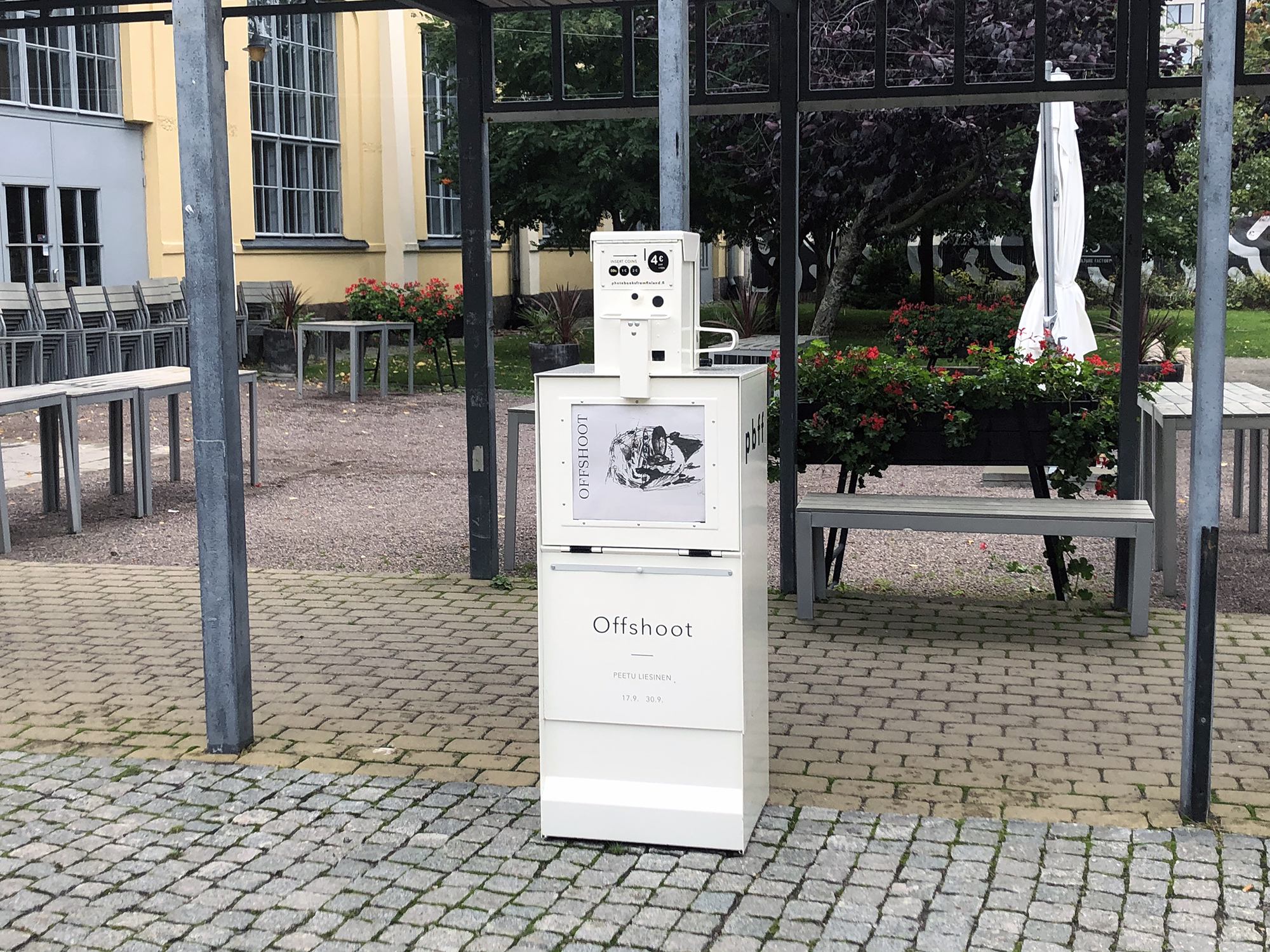
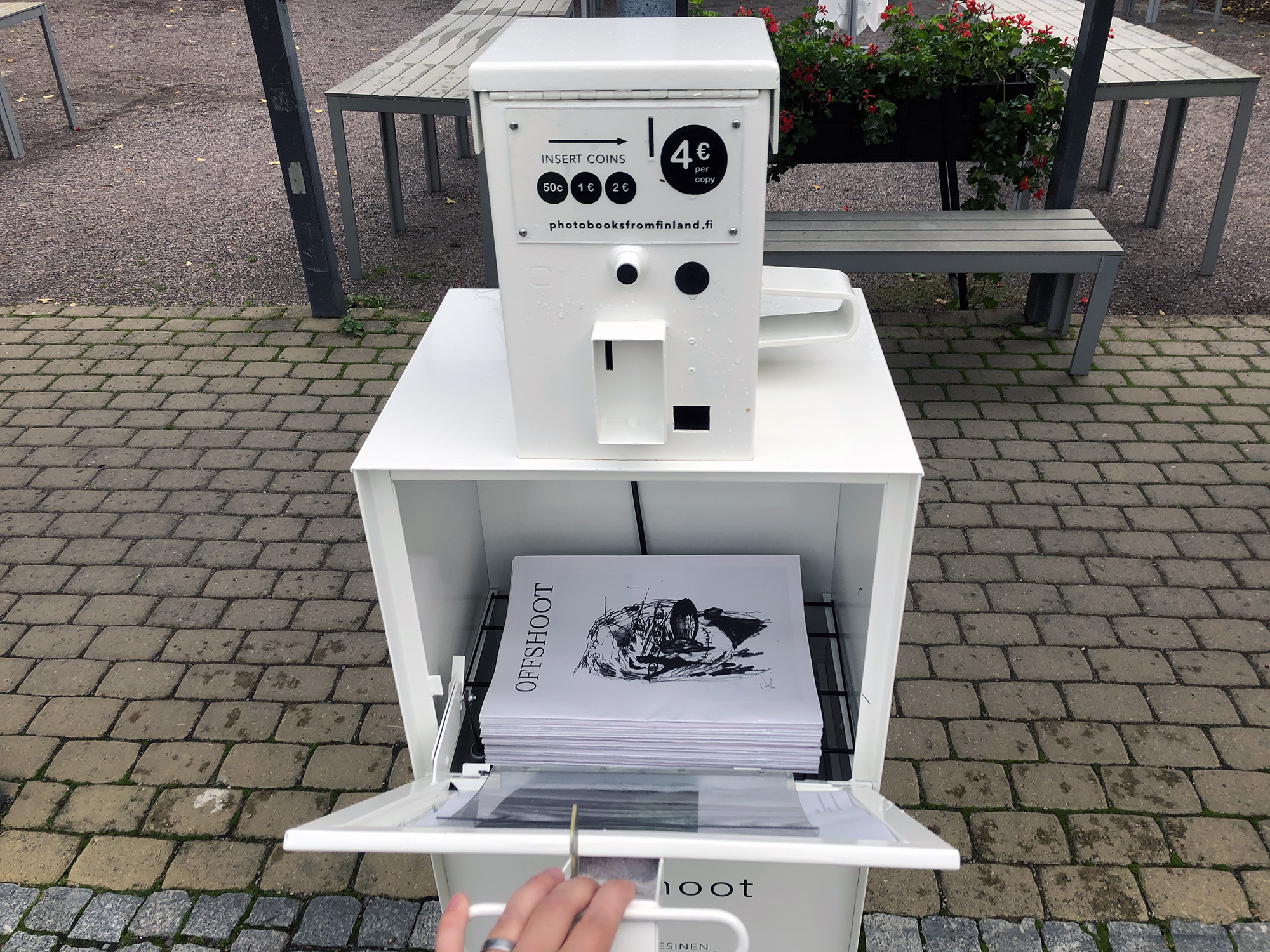
Peetu Liesinen
OFFSHOOT
17.–30.9.2020
OFFSHOOT Magazine shows collection of Liesinen´s filmphotographs and ink works on paper.Photographs shows how and what Liesinen sees. What caught the artists eye. In the magazine photographs and drawings communicate with each other and make a connection between the drawings and photographs.
Peetu Liesinen is a master of arts from Helsinki University of fine arts. He is a painter who draws, photographs and uses collage in his works. Often in his paintings, film photos and drawings combine together making a connection between these two worlds. At the moment Liesinen´s works are on display in Kiasma Seppo Fränti´s Mad Love -collection exhibition.
OFFSHOOT
17.–30.9.2020
OFFSHOOT Magazine shows collection of Liesinen´s filmphotographs and ink works on paper.Photographs shows how and what Liesinen sees. What caught the artists eye. In the magazine photographs and drawings communicate with each other and make a connection between the drawings and photographs.
Peetu Liesinen is a master of arts from Helsinki University of fine arts. He is a painter who draws, photographs and uses collage in his works. Often in his paintings, film photos and drawings combine together making a connection between these two worlds. At the moment Liesinen´s works are on display in Kiasma Seppo Fränti´s Mad Love -collection exhibition.
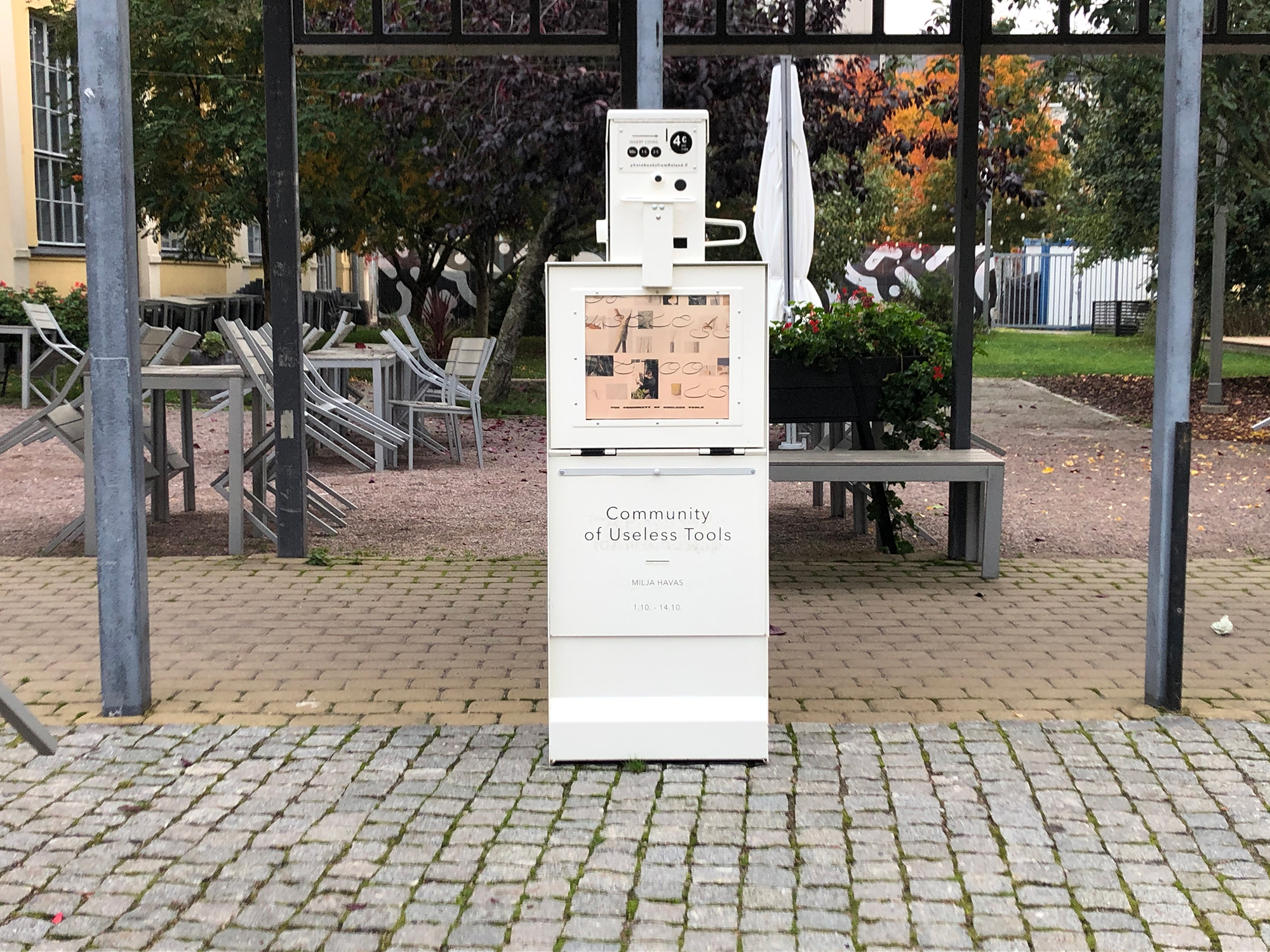
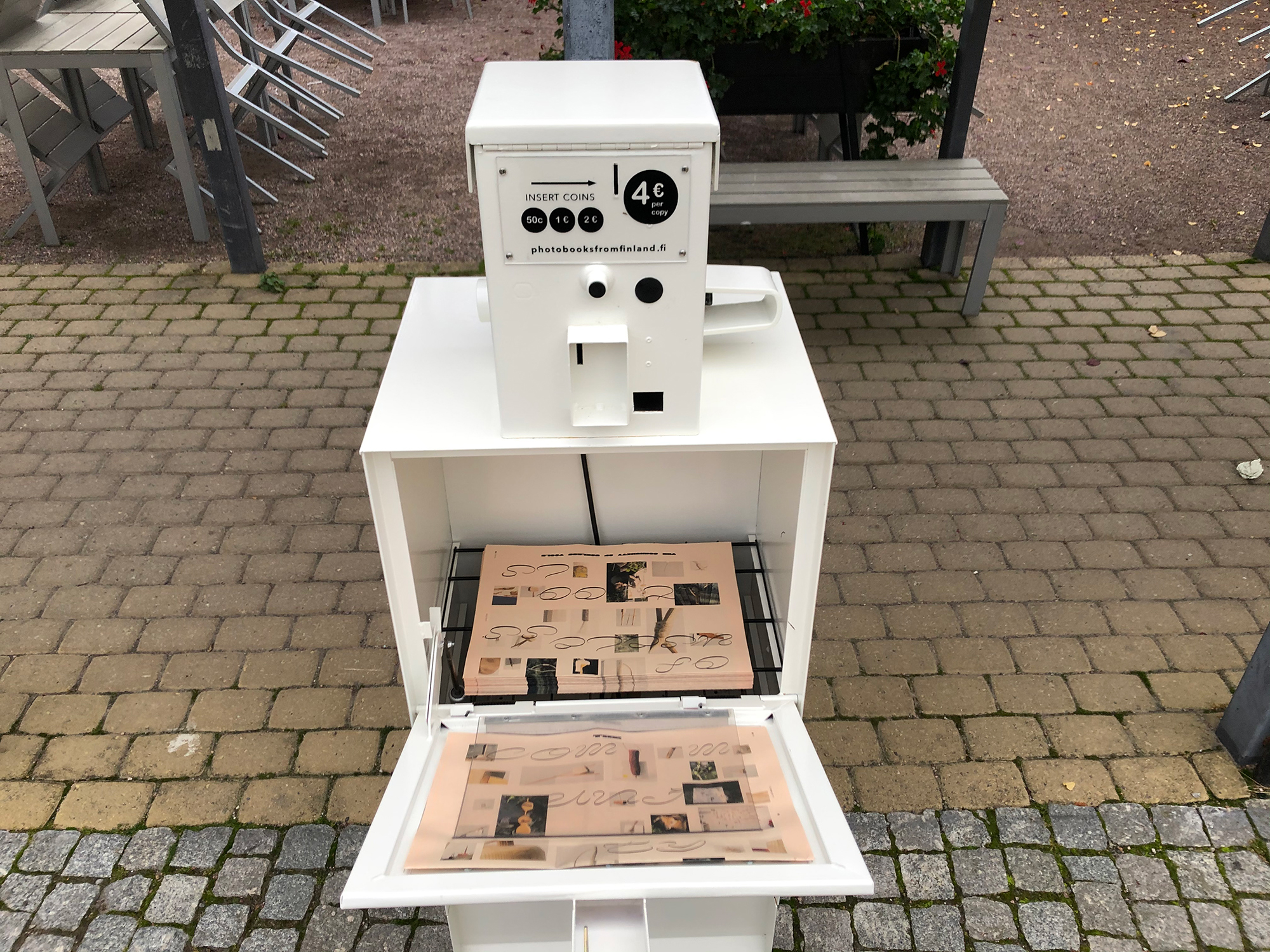
Milja Havas
Community of Useless Tools
1.10.–14.10.2020
Community of Useless Tools is a collection of perplexing and impractical tools that Havas has worked on from 2016 to 2020. The tools crafted by Havas can be called incomplete, inadequate, flawed, imperfect, dissatisfactory or so on, but together they form a community that introduces themes of human memory, the object-oriented nature of reality and the relationship between nature and culture. Havas’ artistic work also raises questions of the connections between artisanship and the manufacturing of art objects.
This publication consists of photographs representing Havas’ works and a text compiled by Joonas Pulkkinen which combines essay writing with an interview of the artist. In the text, Havas’ personal artistic voice and self-reflection of her work are placed in dialogue with Pulkkinen’s contemplations creating various perspectives from which to appreciate Havas’ community of tools.
Based in Helsinki, Milja Havas is an artist studying in Uniarts Helsinki’s Academy of Fine Arts. Havas is a wood carpenter by prior education, inspiring the choice of wood as the primary material of her work in recent years further leading to the deepening of her artistic thinking. Although Havas bases her work on the materials, she also brings together different techniques in a playful way that can tilt our established perceptions of reality.
Community of Useless Tools
1.10.–14.10.2020
Community of Useless Tools is a collection of perplexing and impractical tools that Havas has worked on from 2016 to 2020. The tools crafted by Havas can be called incomplete, inadequate, flawed, imperfect, dissatisfactory or so on, but together they form a community that introduces themes of human memory, the object-oriented nature of reality and the relationship between nature and culture. Havas’ artistic work also raises questions of the connections between artisanship and the manufacturing of art objects.
This publication consists of photographs representing Havas’ works and a text compiled by Joonas Pulkkinen which combines essay writing with an interview of the artist. In the text, Havas’ personal artistic voice and self-reflection of her work are placed in dialogue with Pulkkinen’s contemplations creating various perspectives from which to appreciate Havas’ community of tools.
Based in Helsinki, Milja Havas is an artist studying in Uniarts Helsinki’s Academy of Fine Arts. Havas is a wood carpenter by prior education, inspiring the choice of wood as the primary material of her work in recent years further leading to the deepening of her artistic thinking. Although Havas bases her work on the materials, she also brings together different techniques in a playful way that can tilt our established perceptions of reality.

Sergei Pavlov
20-25
15.10.–28.10.2020
Johannes Romppanen invited me to this project. I sent over 1000 images to him from which he chose small edit and made an proposing layout. We had discussions about the images and about the selection. The images we’re consisted mostly documentary portraits of my family, friends and an lover. Photos remind me of many countries, few years and million memories. It felt so free to let go of the role of choosing the images and trying to create the story. Of course, I see the stories behind the images but Johannes didn’t. I felt it’s more interesting to combine this kind of way of working. Very personal work edited mostly by person who doesn’t know too much behind the images. The name to the publication came from my age. Images were done when I was 20 - 25 years old. I had certain style of working which has changed vey much now. In a way this reminds me of the craving for freedom and hunger for adventure. Yet, reminds me that the only way to grow is some how to let go.
Sergei Pavlov (b.1994) is Russian-Finnish photographer. His photographic works consist mostly of series made of documentary black and white portraits. Either project-based working or more auto-fictive storytelling, the main theme in his work is to study, define and questions the human condition with an emotional perspective.
20-25
15.10.–28.10.2020
Johannes Romppanen invited me to this project. I sent over 1000 images to him from which he chose small edit and made an proposing layout. We had discussions about the images and about the selection. The images we’re consisted mostly documentary portraits of my family, friends and an lover. Photos remind me of many countries, few years and million memories. It felt so free to let go of the role of choosing the images and trying to create the story. Of course, I see the stories behind the images but Johannes didn’t. I felt it’s more interesting to combine this kind of way of working. Very personal work edited mostly by person who doesn’t know too much behind the images. The name to the publication came from my age. Images were done when I was 20 - 25 years old. I had certain style of working which has changed vey much now. In a way this reminds me of the craving for freedom and hunger for adventure. Yet, reminds me that the only way to grow is some how to let go.
Sergei Pavlov (b.1994) is Russian-Finnish photographer. His photographic works consist mostly of series made of documentary black and white portraits. Either project-based working or more auto-fictive storytelling, the main theme in his work is to study, define and questions the human condition with an emotional perspective.